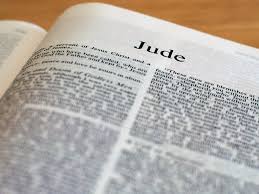"Jesus, Who Saved a People" -- Jude 5-16
 Tuesday, July 5, 2016 at 10:14AM
Tuesday, July 5, 2016 at 10:14AM  The Second in a Series on the Book of Jude
The Second in a Series on the Book of Jude
What was a typical sermon like in the apostolic age? How did those men identified with the apostolic circle preach? In verses 5-16 of the Epistle of Jude we find such a sermon (or at least a portion of such a sermon) which serves as the main body of Jude’s short epistle. Citing from the Old Testament as well as two apocryphal Jewish writings (the Assumption of Moses and the Book of Enoch), Jude reminds his readers that God has a long and consistent history of dealing with false teachers and apostates. The Old Testament incidents which Jude recounts, serve as graphic illustrations and a reminder of the certain fate of those who attempt to deceive the people of God. Even as Jude exhorts his readers to “contend for that faith once for all delivered to the saints,” they are to also build themselves up in the most Holy faith, and to pray in the Holy Spirit, knowing that unrepentant false teachers who have infiltrated the church and deceived God’s people will face God’s full fury and wrath on the last day.
We return to our brief series (three sermons) on the Epistle of Jude. Last time, we covered introductory matters and the first four verses of this short but packed epistle. This epistle was written by Jude–the brother of James and half-brother of Jesus–as early as the mid-fifties of the first century. While Jude doesn’t give us any of the specifics about the church to which he is writing, there is enough information in the epistle’s twenty-five verses to ascertain that Jude is writing to a congregation which was composed largely of Jewish converts to Christianity. The members of this church were steeped in Jewish mysticism and end-times speculation–we will see why that is important momentarily. Jude has learned that the churches were facing a very serious internal crisis, prompting Jude to write this epistle, which is essentially an urgent warning to the churches to deal with these false teachers before they do any more damage to the people of God.
We learn in verse 3, that Jude was planning to write a letter about “our common salvation,” when word reached him that a group of traveling prophets and teachers had crept into at least one of the churches, introducing a dangerous form of antinomianism. Antinomians teach that since Jesus fulfilled the law, and we are saved by God’s grace through faith and not by our works, Christians are not in any sense bound to obey the commandments of God. Such antinomians remain with us to this day. The particular group of false teachers of which Jude has become aware were claiming that God was revealing himself to them through dreams and visions, which gave great credibility to their deceptive message. Upon learning that this was going on, Jude ceases work on his other more comprehensive letter and sends this short epistle to the church exhorting them to deal with these men quickly before they can do any more damage.
In the first four verses (the opening section), Jude exhorts his readers/hearers to contend for the faith once for all delivered to the saints. In verses 5-16 (our text this time), Jude makes his case that the actions of these false teachers were foretold throughout the Old Testament. In these verses we find an apostolic sermon (or an excerpt from one) based upon a number of Old Testament texts, and which also include references to two apocryphal books: The Book of Enoch (alluded to in verse 6 and quoted by Jude in verses 14-15), and the Assumption of Moses (quoted in verses 9 and 16 of our text). Citing numerous Old Testament examples, Jude demonstrates that the history of redemption teaches us that God’s judgment will fall upon these men now plaguing the church.
Then, In verses 17-25 (which we will cover on Palm Sunday, the 29th), Jude concludes by reminding his beloved brethren that the appearance of false teachers was the very thing the apostles (whom many in the congregation had heard preach with their own ears) warned would happen. Even as they are contending for the faith once for all delivered, these Christians are to use this time to build themselves up in the most holy faith and pray in the Holy Spirit, while they wait patiently for the coming of the Lord.
To read the rest of this sermon, Click Here


Reader Comments